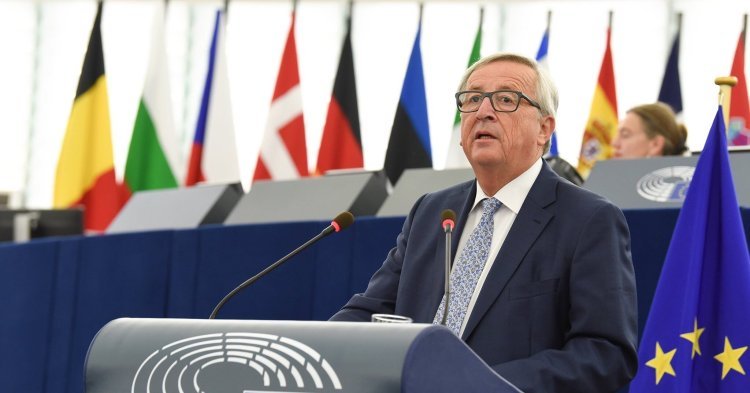European Economic Growth
A large part of Juncker’s speech focused on the relatively positive figures of growth and economic recovery Europe has produced over the last year. With unemployment at a nine-year low, Eurozone growth at 2.2%, and €225 billion of extra investment due to EU programmes, it seems that Europe is back on track. [1:3]
Interestingly, Juncker added a short nuance: “The European Commission cannot take the credit for this alone. Though I am sure that had 8 million jobs been lost, we would have taken the blame.” I could not help but think he was completely, and sadly, 100% correct in saying this. Too often has Europe been blamed for issues mostly caused by individual member states’ governments (a prime example being the location of the Parliament, which France has insisted on remaining split between Brussels and Strasbourg.)
Juncker then went on to stress the importance of European trade, [1:5-6] mentioning the recently-struck trade deal with Canada (which, to mention another example of national authorities blocking common progress, was almost cancelled because the Walloon parliament did not agree [2]), and forthcoming negotiations with Japan, New Zealand, and Australia.
Migration
On the refugee crisis, which dominated news headlines in 2015 and for which the EU received plenty of criticism, Juncker was also positive. He focused on the progress reached in this area, claiming arrivals across the Eastern Mediterranean had been reduced by 97%, and by 81% in the central part of the same sea. The European Border and Coast Guard – an institution which, I would think, most European federalists would agree with me is an immensely valuable and decent organisation – was also praised by the President, who claimed the EU is no longer abandoning member states who were bearing the brunt of the refugee influx. [1:10-11]
In a squint at member states who have so far refused to house migrants, such as Hungary, Juncker said: “Even if it saddens me to see that solidarity is not yet equally shared across all our Member States, Europe as a whole has continued to show solidarity”, and encouraged further action on migration to take place.
Expansion and Restructuring of the Union
In a move that should excite us as European federalists, Juncker pushed for expansion and integration of the Union, encouraging the immediate opening of the Schengen area to Romania and Bulgaria [1:19-20] and the adoption of the Euro by every member state, not by some. Moreover, the creation of the office of a European Finance Minister to oversee the Eurozone was also hailed by the President as a move that could bring about true benefits.
In another centralising move, and one that I would personally support wholeheartedly, Juncker also suggested combining the Presidencies of the Commission and the Council, to create a less complicated system of governance. Although he did not openly support the reform proposals brought forward by French President Macron, Juncker did state he was open to his ideas, which in itself is progress of a kind. [3] Moreover, he also supported the creation of transnational lists for the European Parliament, something which the New Federalist has published about before.
On Turkey, the President took a firm stand, joining Merkel and her main challenger Martin Schulz, who in a TV debate called for the immediate suspension of accession talks with Erdogan. [4] Although Juncker did not explicitly say as much, he did call upon Turkey to release European journalists and maintain the rule of law, and sees any successful accession float away into the distance further every day. He also called for an active fight to protect Europe’s hard-won freedoms. [1:18-20]
Brexit
Although it was certainly no main point in Juncker’s speech, I still want to stress how Brexit still impacted the way his address was formed. “We will always regret it [Brexit], and I think you will soon come to regret it as well”, he told Eurosceptic MEPs. [1:31] Apart from a short paragraph surrounding this quote, there was no mention of Brexit. And that, in my eyes, is an extremely refreshing and positive development. Europe can no longer be dragged down by the UK’s leaving, and indeed that is what Juncker himself said, too.
Although the BBC still framed the entire speech as being about them, and immediately starting to quote Farage – who, as usual, refused to give any factual evidence for the most grotesque claims and demagogy, [5] Juncker explicitly said the EU will move on, and be stronger for the UK’s exit. It seems, then, that the boom Europe needed may very well have been partly delivered due to Brexit – although, what a cost it is.
Federalism
Although Juncker’s speech is, in a sense, a positive for Federalists, we should in no way be satisfied with it. Although we know progress is slow, we must continue to push Europe forward. The Commission President has taken up some federalist ideas, but we should not think that our work is now over. Before Juncker’s ideas are put into practice, unanimous consent must first be given by member states – the biggest hurdle for any large, concrete European-wide plans, as we well know. It’s a long way to real reform, a long and tough way, but perhaps, with Juncker’s wind in the EU’s sails, we may just achieve small steps in the right direction. Read the full text of this year’s State of the Union here.
Sources
[1] European Commission (2017) PRESIDENT JEAN-CLAUDE JUNCKER’S State of the Union Address 2017. Available from http://europa.eu/rapid/press-release_SPEECH-17-3165_en.htm [Accessed 13/09/2017]
[2] Rankin, Jennifer (2016) EU-Canada free trade deal at risk after Belgian regional parliament vote. Available from https://www.theguardian.com/business/2016/oct/14/eu-canada-free-trade-deal-ceta-in-jeopardy-belgium-wallonia-parliament-vote [Accessed 13/09/2017]
[3] NOS (2017) Juncker wil dat alle EU-lidstaten de Euro invoeren. Available from https://nos.nl/artikel/2192713-juncker-wil-dat-alle-lidstaten-de-euro-invoeren.html [Accessed 13/09/2017]
[4] Berliner Zeitung (2017) Türkei-Debatte im TV-Duell: Schulz will EU-Verhandlungen mit Erdogan abbrechen. Available from http://www.berliner-zeitung.de/28350212 [Accessed 13/09/2017]
[5] BBC News (2017) Brexit: UK will ’soon regret’ leaving EU argues Juncker. Available from http://www.bbc.co.uk/news/uk-politics-41252653


Follow the comments: |
|
